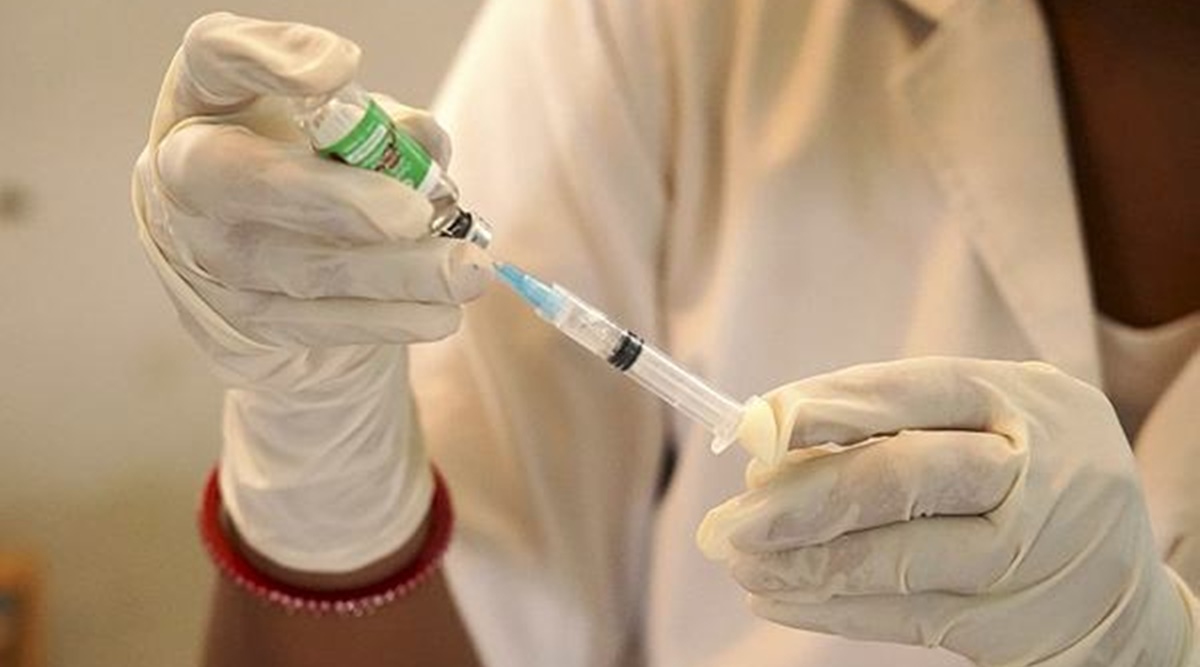 A majority (93.4 percent) received Covishield, the Oxford-AstraZeneca vaccine manufactured by Serum Institute of India, and the remainder, Covaxin, produced by Bharat Biotech. (File Photo)
A majority (93.4 percent) received Covishield, the Oxford-AstraZeneca vaccine manufactured by Serum Institute of India, and the remainder, Covaxin, produced by Bharat Biotech. (File Photo)
A new study by Christian Medical College, Vellore, showed that two doses of vaccination had 94 percent protective effect for ICU admission and 77 percent for hospitalisation when compared with those who were not vaccinated.
The study at the 2600-bed tertiary care hospital included its 10,600 employees, of which 8,991 staffers (84.8 percent) – doctors, nurses, technicians, clerical staff and others – had been vaccinated between January 21 and April 30 this year.
A majority (93.4 percent) received Covishield, the Oxford-AstraZeneca vaccine manufactured by Serum Institute of India, and the remainder, Covaxin, produced by Bharat Biotech.
Total 7,080 staffers were fully vaccinated with both doses, of which 679 contracted Covid-19 infection, 64 were hospitalised, four needed oxygen therapy and only two needed ICU care. There were no deaths.
The findings of the study ‘Protective Effect of Covid-19 Vaccine Among Healthcare Workers During the Second Wave of the Pandemic’ has been published in the Mayo Clinic Proceedings where the authors have written to the editor, stating that it was an imperative to vaccinate frontline workers as quickly as possible.
The study found that vaccination with two doses reduced hospitalisation, need for oxygen therapy and ICU admission. The protective effects of complete immunisation in preventing infection, hospitalisation, need for oxygen and ICU admission were at 65 percent, 77 percent, 92 percent and 94 percent respectively.
Prof Joy Mammen, associate director (medical) and head, department of transfusion medicine, CMC, Vellore, and one of the study authors, said since healthcare workers (HCWs) serve in the forefront during pandemics, they are particularly vulnerable.
“We followed the prevailing guidance for the interval between doses. In Phase 1, it was 28 days and subsequently, it became six to eight weeks. In the latter part of the second phase, the period was extended to minimum 12 weeks,” Prof Mammen said.
Study authors Dr JV Peter, director of CMC Vellore, and others found that protection began even after the first dose. A single shot of the vaccine provided 95 percent protection from ICU admission.
In the study, there were 1,878 staffers who had received one dose of the vaccine. Of these, 200 contracted Covid-19 infection and 22 were hospitalised. Of 1,609 staffers, who were not vaccinated, 438 contracted Covid-19, 64 were hospitalised, 11 needed oxygen therapy, eight required ICU admission and one death was reported.
“It was not an efficacy study, rather an observational one. This is a limited group that we studied. But at each level, we saw the benefit of vaccination. The only staff member, who died since the beginning of the pandemic, had multiple co-morbidities and had not taken the vaccine,” he said.
The study authors said the subgroup analysis on the efficacy of the two vaccines was not possible due to few HCWs receiving Covaxin. Some HCWs (17 percent) could not take the second dose, initially due to vaccine shortage and subsequently, due to changes in guidelines on the interval between doses.
“The study shows that vaccines are performing well,” top vaccine scientist Dr Gagandeep Kang told The Indian Express.
The authors also observed that a study of 23,324 HCWs in the UK reported vaccine coverage of 89 percent. During the two-month follow up, symptomatic and asymptomatic infections occurred in 80 participants (3.8 percent) among vaccinated and 977 (38 percent) among unvaccinated.
In another study from Jerusalem, infection occurred over two months in 366 (6.9 percent) of 5,297 vaccinated HCWs and 213 of 754 unvaccinated individuals. A third study from California (n=28,184), showed that only 37 HCWs, who received two doses of vaccine, tested Covid-positive.
“Our study corroborates these studies that vaccination is protective, although we did not look at the variants responsible for the massive second wave. Beyond the immediate, implications for public health include cost-effective protection from infection, reduction of illness severity and an intervention to break the chain of transmission effectively. Even as many states chose to restrict movement to reduce stress on the healthcare system, future waves can at best be prevented or at worst mitigated through aggressive and widespread vaccination,” the study said.
- The Indian Express website has been rated GREEN for its credibility and trustworthiness by Newsguard, a global service that rates news sources for their journalistic standards.

